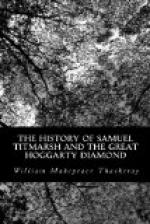I never had any more venison from the family; but I’ll tell you what I had. About a month after came a card of “Lord and Lady Tiptoff,” and a great piece of plum-cake; of which, I am sorry to say, Gus ate a great deal too much.
CHAPTER VI
OF THE WEST DIDDLESEX ASSOCIATION, AND OF THE EFFECT THE DIAMOND HAD THERE
Well, the magic of the pin was not over yet. Very soon after Mrs. Brough’s grand party, our director called me up to his room at the West Diddlesex, and after examining my accounts, and speaking awhile about business, said, “That’s a very fine diamond-pin, Master Titmarsh” (he spoke in a grave patronising way), “and I called you on purpose to speak to you upon the subject. I do not object to seeing the young men of this establishment well and handsomely dressed; but I know that their salaries cannot afford ornaments like those, and I grieve to see you with a thing of such value. You have paid for it, sir,—I trust you have paid for it; for, of all things, my dear—dear young friend, beware of debt.”
I could not conceive why Brough was reading me this lecture about debt and my having bought the diamond-pin, as I knew that he had been asking about it already, and how I came by it—Abednego told me so. “Why, sir,” says I, “Mr. Abednego told me that he had told you that I had told him—”
“Oh, ay-by-the-bye, now I recollect, Mr. Titmarsh—I do recollect—yes; though I suppose, sir, you will imagine that I have other more important things to remember.”
“Oh, sir, in course,” says I.
“That one of the clerks did say something about a pin—that one of the other gentlemen had it. And so your pin was given you, was it?”
“It was given me, sir, by my aunt, Mrs. Hoggarty of Castle Hoggarty,” said I, raising my voice; for I was a little proud of Castle Hoggarty.
“She must be very rich to make such presents, Titmarsh?”
“Why, thank you, sir,” says I, “she is pretty well off. Four hundred a year jointure; a farm at Slopperton, sir; three houses at Squashtail; and three thousand two hundred loose cash at the banker’s, as I happen to know, sir,—that’s all.”
I did happen to know this, you see; because, while I was down in Somersetshire, Mr. MacManus, my aunt’s agent in Ireland, wrote to say that a mortgage she had on Lord Brallaghan’s property had just been paid off, and that the money was lodged at Coutts’s. Ireland was in a very disturbed state in those days; and my aunt wisely determined not to invest her money in that country any more, but to look out for some good security in England. However, as she had always received six per cent. in Ireland, she would not hear of a smaller interest; and had warned me, as I was a commercial man, on coming to town, to look out for some means by which she could invest her money at that rate at least.




